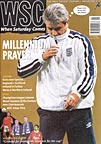 Brian Kidd has been sacked as Blackburn Rovers manager, but Ray Chenery is not too sure whether it was all his fault
Brian Kidd has been sacked as Blackburn Rovers manager, but Ray Chenery is not too sure whether it was all his fault
I started watching Blackburn Rovers in 1958. That makes me one of those old codgers whose knowledge and wisdom earn respect and hushed attention.
Since the arrival of Jack Walker as a fairy godfather, the history of the club before 1992 has been forgotten or passed over by most of the outside world. For those too young to remember, Rovers were a First Division club from 1958 to 1966 before spending a quarter of a century in the Second (and below). So does that make us a big club, temporarily fallen on hard times? Or a small-town club whose day in the sun is over?
It took me less than a week to get bored of the Brian Kidd story. We’ve seen it all before and, give or take a Premiership title, this is the story of Everyclub. Yes, there is interest in speculating about the new manager (still not announced at the time of writing), but what then? The chosen man will be presented at a press conference. He will be the right choice from a strong shortlist; he will relish the challenge, but it won’t be easy; we’ll need patience (“we” already); there’s a lot of hard work to do; he’ll assess the squad he’s inherited before bringing in new men.
There will be the pictures on the pitch with the scarf, smiling just as Brian Kidd did 11 months ago, and Roy Hodgson before him. We lapped it up then and we’ll do so again, because it’s the triumph of hope over experience, the doctor telling the injured patient that all will be well, and we want to believe it.
Regardless of whether or not Kidd should have gone (and it’s debatable), the fans cannot claim there is an obvious solution for Rovers, no matter how much money is available to their managers. At the home defeat by QPR at the end of October, one section of the crowd chanted for “Tony Parkes’s blue and white army”, while others countered with “Give Kidd a chance”.
Some fans demand positive support only, while others, as always, have decided certain players are useless, and wait for any mistake to show they are right. The match ended to the sound of loud booing and chants of “You’re not fit to wear the shirt”.
But we are the fans who can tell from behind the goal that the linesman at the far end has got an offside decision wrong, or that a yellow card wasn’t deserved. We don’t even seem to realise that a referee is allowed to overrule his linesman, or that all of the ball must cross the line. So what do we know?
When it comes to judging the state of affairs inside the club, we are mushrooms, kept in the dark. Clubs feed us PR pap, hide things we really should be told and deny things they later admit.
The current accepted wisdom at Blackburn is that the recent crisis is largely down to the players, not because of lack of ability, but rather of attitude – the desire, the commitment aren’t there. I can’t see it myself, but then I’ve always had trouble with the concept of players not trying. There seems to be plenty of effort, plenty of running until the final whistle. I find it hard to single out a player who has not been performing, yet the team as a whole is going nowhere.
All the usual suspects have been rounded up: the manager, the pampered players, the grumbling fans, acclimatisation to a lower division, backroom discord, referees, bad luck, injuries. All we know is it will eventually change for the better. And then it will go wrong again. Any long-serving fan knows that the downs always outweigh the ups, that happiness is brief and illusory, and must be grasped, savoured and committed to memory to warm us during the long cold spells.
“And it’s no nay never, no nay never no more, will we play Burnley Bastards, no never, no more.” I think we will.
From WSC 155 January 2000. What was happening this month